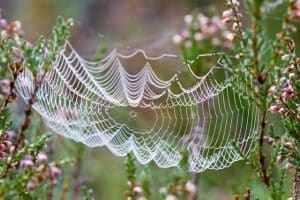In the night, I found her, my sister, laying atop a crimson cloud, her ruby-soaked hand torn, its wretched fingers gripping like claws. I didn’t know she was dead. Not really. But I did know that what was beside her was alive—and more importantly, it knew I was too.
#
We arrived at the hell-house only the night prior, and the devil greeted us under the guise of a goddess. Gold-speckled ivory teeth. Soft Eyes. A face full of saggy creases. It was Nani, in all but truth, and she greeted us with the typical pinches, back-handed compliments, and relentless stabbing of questions.
The drive from the airport to the estate left Jo and I unable to see beyond the creature’s mask; the suffering blinded us. The island was luminous and refreshing, but what we passed along the way was not so shining. Collapsing sheds, naked children, gang-ridden alleys—surely this had all existed in Trinidad before, but now it seemed more daunting, more personal, more real. Jo felt it too. I could see it in her eyes: a sadness derived from knowing that where we had come from was a place no longer worth going towards.
As Jo and I unloaded the taxi, golden palm trees, nature’s glorious skyscrapers, watched us walk into a nightmare. I’d like to think that, if they could, those trees would have screamed, “Go back! It’s a trick! That’s not your grandmother, you fools!” Sadly, trees can’t talk and therefore can’t scream and therefore couldn’t help and therefore my sister’s dead—God really dropped the ball on that one.
Nani ushered us into the house. There, upon the dining room table, glowed a splendid feast of aromatic Caribbean cuisine: mounds of fragrant, seasoned chicken breasts dripping in jerk sauce; aloo pies with doughy crusts and stuffed interiors steaming with fiery passion; plates of bhaji as green and lush as moss; plantains with crispy brown outsides and gilded insides; fluffy, oil-drenched buss-up-shut paratha—no rice.
Nani always supplemented her meals with white rice designed to soak up blazing, amber curries, or peppery rice paired with ruby beans, or sweet rice served inside the shells of coconuts, or even sweeter rice drowned in torrid sugar and milk. It was often, during our visits, that Nani would employ Jo and I as her assistants in cookery, demanding that we lift bags of rice and set them to boil. That night, there was none of this, and Jo did not hesitate to speak on it.
“Dey had no rice at dee mahket,” Nani dismissed and scurried to pack the food away. Jo and I did not question her further. By then, our eyes had taken on the weight of anvils, and we settled in for the night. I awoke to high whispers and low screams and nullifying silence.
#
The beast had now shed Nani’s skin and released its true terrible form. I ran before I screamed before I wept before I whispered a wordless prayer, and like a blistering tornado, the soucouyant followed, boiling through brick and carpet and wood. The beast squealed a devilish song, its screeches adopting the voices of those familiar and forgotten, known and unknown.
“Why do you run? Why do you cry? Why do you go,” the soucouyant hollered. The beast’s heat lashed at my back. It did not burn like fire but singed like ice. The soucouyant took the voice of Jo, calling, “Don’t leave me. Look at me.”
Nani’s stories echoed with every step I took, her tales of douens and jumbies and churiles. “Dee soucouyant takes dee form of a hag. Put rice round dee house. Dee socuoyant must count dem,” Nani’s voice boomed. The image of her wrinkled skin, sitting on the floor like a pile of clothes, spurred my legs to move quicker. As I soared, the soucouyant soared too, through hallways and down staircases until we finally reached the kitchen.
I could see Jo, with the load atop her head, pretending to topple as she stuck her tongue out at me. I could see the cabinet. I really could. And so, I ran to it and heaved its door open. And just as the beast lashed a scorching hook around me, I yanked the bag out. Grains rained like speckles of divinity in this house of death, like snowflakes gracing a desert plain. As it hit the floor, the rice hissed and clicked, sweltering midair. I kicked out the remaining scraps and the monster began to roar, counting the particles in its devilish tongue. It dared not turn to me—it couldn’t.
The papers wrote of an ultimate tragedy: a housefire that led to the death of a girl and her grandmother and left a little boy scarred with burns. I walked out those doors, and the house collapsed upon itself. I know what I saw—fire. Golden fire. And as the fire of the earth engulfed the fire of hell, heaven resounded with joy, and rice poured from the sky.
Tyler Sookralli is a passionate poet, writer, and student at The University of Chicago. Interested in the intersection between oral and literary storytelling, he is an ardent creator with work appearing in The Blue Marble Review, The WEIGHT Journal, TeenInk Magazine, and beyond. A big fan of all things horror and fantastical, it is almost necessary that he incorporates speculative elements into his artwork. You can find Tyler on Twitter @tylersookralli.
The Devil Wears Skin is the winner of the Apparition Literary Magazine April Flash Fiction Challenge.
Photo by Luke Schobert on Unsplash






